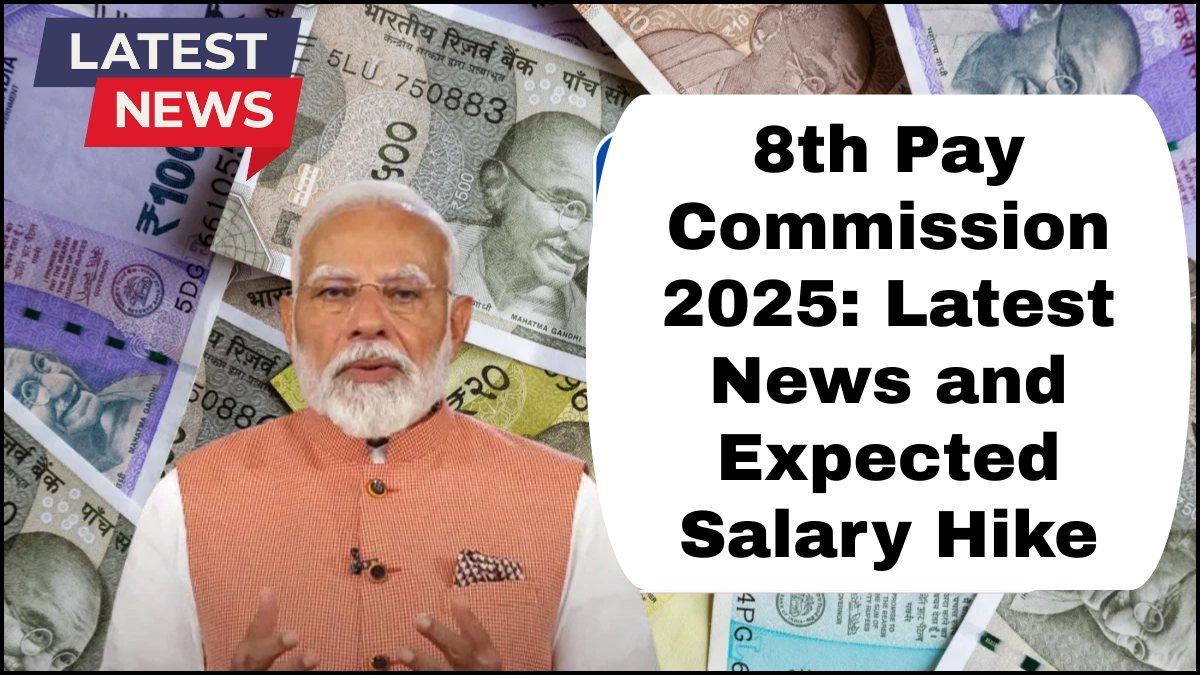The 8th Pay Commission News has been a trending topic among central government employees, pensioners, and financial analysts in 2025. As the government gears up for its next major revision in pay structures, expectations are running high. The 8th Pay Commission, once implemented, will redefine the salary, allowances, and pension structures for millions of employees under the Central Government.

Below, we break down the latest updates, probable timelines, salary hike expectations, and the broader implications of this reform.
What is the 8th Pay Commission?
The Pay Commission is a government-appointed body that reviews and recommends changes to the salary, allowances, and pension structures of central government employees and retirees. Traditionally, these commissions are set up every 10 years, with the 7th Pay Commission having been implemented in 2016.
The 8th Pay Commission will not only adjust for inflation but also consider changes in the cost of living, economic growth, and the need to maintain employee morale and efficiency in government service.
Latest Update 2025 on the 8th Pay Commission
As per latest update 2025, discussions within government circles indicate that the 8th Pay Commission’s report may be finalized by the end of 2025, with implementation expected in early 2026. However, political analysts suggest that pre-election announcements could accelerate timelines.
Key points from recent developments:
-
Formation of Committee: Reports suggest the government may soon appoint the official committee to draft the pay revision proposal.
-
Focus on DA Merger: One major point of discussion is merging the Dearness Allowance (DA) with the basic pay before the final hike.
-
Digital Salary Revision Models: For the first time, salary revision formulas may be integrated into an online calculator for transparency.
Expected Salary Hike in the 8th Pay Commission
Based on current inflation trends and economic data, experts predict a salary hike of 20% to 25% in basic pay for central government employees.
Possible Structure:
-
Basic Pay Increase: The fitment factor could be revised from 2.57 (7th CPC) to anywhere between 3.0 and 3.5, significantly boosting the minimum and maximum salaries.
-
Allowances Update: House Rent Allowance (HRA), Travel Allowance (TA), and Medical Allowances are likely to see proportional increases.
-
Pension Revision: Pensioners may receive an equal percentage increase, ensuring parity between serving employees and retirees.
Example:
If the current basic pay is ₹18,000, a 3.5 fitment factor could push it to ₹25,200, before including allowances.
How the 8th Pay Commission Will Impact Government Employees
The salary revision will have far-reaching effects, including:
-
Increased Disposable Income – A higher take-home pay will boost purchasing power for employees.
-
Economic Ripple Effect – Increased spending by employees can stimulate retail, real estate, and service industries.
-
Improved Job Attraction – Competitive salaries could attract skilled professionals to government jobs.
Challenges in Implementation
While the 8th Pay Commission News brings optimism, it also comes with challenges:
-
Budgetary Pressure: A significant salary hike means higher government expenditure, potentially increasing fiscal deficit.
-
State Government Concerns: Many states follow central pay commission recommendations, which could strain their finances.
-
Inflationary Impact: Higher salaries could increase demand for goods and services, pushing up prices.
8th Pay Commission and Inflation Adjustments
One reason for the substantial hike is the steady rise in inflation over the past decade. The government must ensure that salaries keep pace with the cost of living while maintaining fiscal balance. The commission will likely recommend a formula-based DA increment system that responds more quickly to price changes.
Frequently Asked Questions (FAQ)
Q1: When will the 8th Pay Commission be implemented?
A: Implementation is expected around 2026, but announcements could come earlier based on political decisions.
Q2: How much salary hike is expected in the 8th Pay Commission?
A: Analysts project a hike of 20–25% in basic pay, with a possible fitment factor of 3.0–3.5.
Q3: Will pensioners benefit from the 8th Pay Commission?
A: Yes, pensioners will likely receive proportionate increases to match serving employees’ pay scales.
Q4: Is Dearness Allowance going to be merged with basic pay?
A: This is a strong possibility, as it helps simplify salary structures before calculating hikes.
Q5: Does the 8th Pay Commission cover state government employees?
A: Directly, no. But many state governments adopt similar pay structures after central recommendations.
click here to learn more